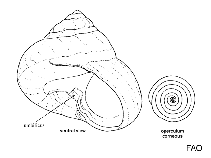Gibbula stoliczkana Nevill & Nevill, 1869
Upload your photos
Google image | No image available for this species;
drawing shows typical species in Trochidae.
Google image | No image available for this species;
drawing shows typical species in Trochidae.
Classification / Names Common names | Synonyms | CoL | ITIS | WoRMS
Gastropoda | Trochida | Trochidae
Environment: milieu / climate zone / depth range / distribution range Ekologi
. Tropical
Utbredning Länder | FAO områden | Ekosystem | Förekomster | Utplanteringar
Western Central Pacific: Philippines.
Length at first maturity / Size / Vikt / Age
Maturity: Lm ? range ? - ? cm Max length : 1.2 cm ShH hane/ej könsbestämd; (Ref. 821)
Length based on occurrence data; to be replaced with better reference.
Life cycle and mating behavior Könsmognad | Reproduktion | Lek | Ägg | Fecundity | Larver
Members of the order Archaeogastropoda are mostly gonochoric and broadcast spawners. Life cycle: Embryos develop into planktonic trocophore larvae and later into juvenile veligers before becoming fully grown adults.
Main reference
referenser | Koordinator | Medarbetare
Springsteen, F.J. and F.M. Leobrera. 1986. (Ref. 821)
IUCN Red List Status (Ref. 130435: Version 2024-1)
CITES status (Ref. 108899)
Not Evaluated
CMS (Ref. 116361)
Not Evaluated
Threat to humans
Human uses
| FishSource |
Verktyg
Ytterligare information
Trophic Ecology
Födoslag
Föda
Födointag
Näringsinnehåll
Predatorer
Föda
Födointag
Näringsinnehåll
Predatorer
Ecology
Population dynamics
Life cycle
Distribution
Human Related
Vattenbruksprofil
Stamps, Coins Misc.
Stamps, Coins Misc.
Outreach
References
Internet-källor
BHL | BOLD Systems | CISTI | DiscoverLife | FAO(Publication : search) | Fishipedia | GenBank (genome, nucleotide) | GloBI | Gomexsi | Google Books | Google Scholar | Google | PubMed | Tree of Life | Wikipedia (Go, sök) | Zoological Record



